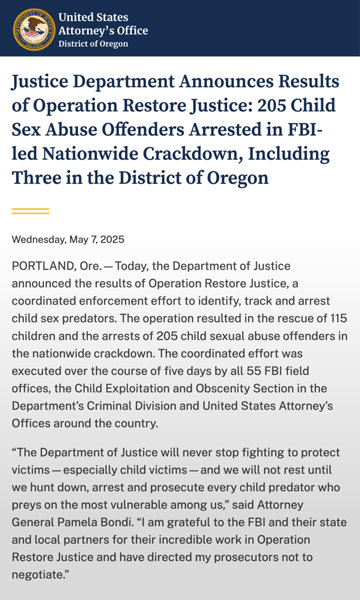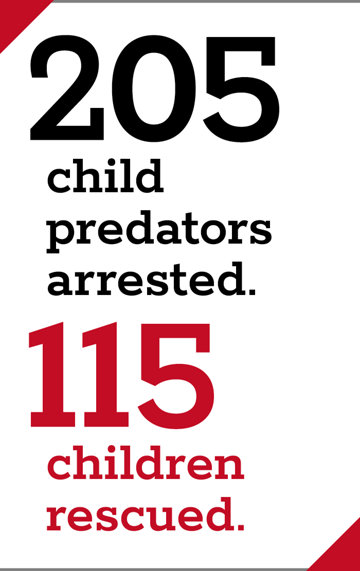The staggering law enforcement effort marks one of the largest synchronized crackdowns on child exploitation in US history. It reveals not only the pervasiveness of online predation but also the growing dangers posed by familiar platforms—gaming apps, social media and chat services—where children increasingly gather.
“Protecting children from exploitation is among the most sacred responsibilities we have in law enforcement.”
Law enforcement officials say the arrests include teachers, military personnel and police officers, underscoring the reality that perpetrators often hold positions of trust. As technology evolves, so too do the tactics used to lure children.
From Salem, Oregon, to Presque Isle, Maine, the faces of those arrested form a disturbing mosaic of betrayal and deceit.
Among them: a 46-year-old former mayor from University Park, Maryland, who was indicted for multiple child exploitation offenses punishable by up to 70 years in prison; a 26-year-old registered sex offender who offered minors cash through social media in exchange for sex acts; and a former police officer in Washington, DC’s elite Metropolitan Police Department, accused of trafficking minors in the nation’s capital.
“These predators often pose as children themselves to trick their would-be victims,” said Acting US Attorney William Narus of Oregon, explaining that deception is “a common thread in these cases”—and the goal is always exploitation.
In the state of Oregon alone, three individuals face a litany of federal charges:
- Michael Cambalik, 35, of Beaverton, who used Call of Duty, an internet-connected gaming platform available in versions that allow players to chat by text, to coerce a 9-year-old into sending him explicit videos.
- Berret Brown, 40, of Vida, is accused of using Snapchat, a multimedia messaging app, and Roblox, an online gaming platform, to lure multiple children into creating sexually explicit content.
- Robert Arias, 54, of Salem, was indicted for distributing, receiving and possessing child pornography.
In the state of Maine, 26-year-old Joseph Maile—a registered sex offender—was arrested for allegedly attempting to traffic minors, including a child under 14, by offering them money via social media. He was one of seven suspects nabbed by the FBI’s Boston Division, which has jurisdiction over Maine.

“Protecting children from exploitation is among the most sacred responsibilities we have in law enforcement,” said United States Attorney Leah B. Foley for the District of Massachusetts. “Each case serves as a difficult reminder that child predators are embedded in our communities. Some take on roles that increase their direct contact with children, while others prey on children from behind a keyboard.”
Officials involved in the operation conveyed one core message consistently: These child predators are pervasive and they don’t lurk only in the shadows. They live in your neighborhood: Some are teachers. Some wear uniforms. Others are friends on your child’s gaming console.
And their impact can be devastating. “There are few situations more urgent than when a child is physically at risk,” said James Crowley, acting special agent in charge of the FBI’s Boston Division. Protecting children from harm is never simple. “As Operation Restore Justice has shown,” Crowley added, “child predators come in many different forms.”
“We will use every resource available to us to pursue those who prey on children.”
Nationwide, the arrests were the result of collaboration between all 55 FBI field offices, state and local law enforcement agencies and a constellation of US Attorneys’ offices, along with the Child Exploitation and Obscenity Section of the Department of Justice (DOJ), created in 1987 to protect “the welfare of America’s children and communities by enforcing federal criminal statutes relating to the exploitation of children and obscenity.”
The sweep, which followed National Child Abuse Prevention Month in April, is part of Project Safe Childhood, an initiative launched in 2006 to combat the scourge of child exploitation.
Attorney General Pamela Bondi, announcing the results of Operation Restore Justice, called the crimes “particularly heinous” and promised swift, uncompromising justice. “We will not rest until we hunt down, arrest and prosecute every child predator who preys on the most vulnerable among us,” the DOJ quoted Bondi as saying in a May 7 news statement.

FBI Special Agent Leslie Adamczyk, speaking from Baltimore, emphasized the dangers of unchecked digital access. “It doesn’t really matter if you’re in Baltimore or if you’re in NYC or if you’re in a more rural area,” she said. “The internet is far-reaching.”
Community vigilance, officials stressed, remains the first line of defense. One predator, for example, was apprehended in California just eight hours after a child bravely disclosed their abuse to FBI agents during an online safety presentation.
“Tell your kids that if you do find something or if they have done something, they’re not going to be in trouble,” Adamczyk said. “They should feel that they can come to you, because if they can come to you and you can have an honest communication and conversation about it, that’s going to be way better than if they get exploited by someone online.”
FBI Director Kash Patel echoed that sentiment. “Operation Restore Justice proves that no predator is out of reach,” he said, “and no child will be forgotten.”
While the operation’s success was historic, officials caution that their efforts are far from over. “Our work continues,” said FBI Portland Special Agent in Charge Douglas A. Olson. “We will use every resource available to us to pursue those who prey on children, as well as to help victims of abuse access tools to help them heal.”






















